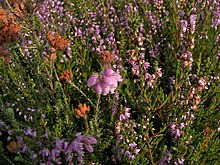I
Auf der Heide blüht ein kleines Blümelein
und das heißt Erika!
Heiß von hunderttausend kleinen Bienelein
wird umschwärmt Erika!
Denn ihr Herz ist voller Süßigkeit,
zarter Duft entströmt dem Blütenkleid.
Auf der Heide blüht ein kleines Blümelein
und das heißt Erika!
In der Heimat wohnt ein kleines Mägdelein
und das heißt Erika!
Dieses Mädel ist mein treues Schätzelein
und mein Glück, Erika!
Wenn das Heidekraut rot-lila blüht,
singe ich zum Gruß ihr dieses Lied.
Auf der Heide blüht ein kleines Blümelein
und das heißt: Erika!
In mein'm Kämmerlein blüht auch ein Blümelein
und das heißt Erika!
Schon beim Morgengrau'n sowie beim Dämmerschein
schaut's mich an, Erika!
Und dann ist es mir, als spräch' es laut:
„Denkst du auch an deine kleine Braut?“
In der Heimat weint um dich ein Mägdelein
und das heißt Erika! | I
On the heath there blooms a little flower
and it's called Erika!
Eagerly a hundred thousand little bees
swarm around Erika!
For her heart is full of sweetness,
a tender scent escapes her blossom-gown.
On the heath there blooms a little flower
and it's called Erika.
II
Back at home there lives a little maiden
and she's called Erika!
That girl is my faithful little darling
and my joy, Erika!
When the heather blooms in a reddish purple,
I sing her this song in greeting.
On the heath there blooms a little flower
and she's called Erika!
III
In my room there also blooms a little flower
and she's called Erika!
Already in the grey of dawn as it does at dusk
it looks at me, Erika!
And then it seems to me, as if it's saying aloud:
"Are you thinking of your little bride?"
Back at home a maiden weeps for you
and she's called Erika! |

